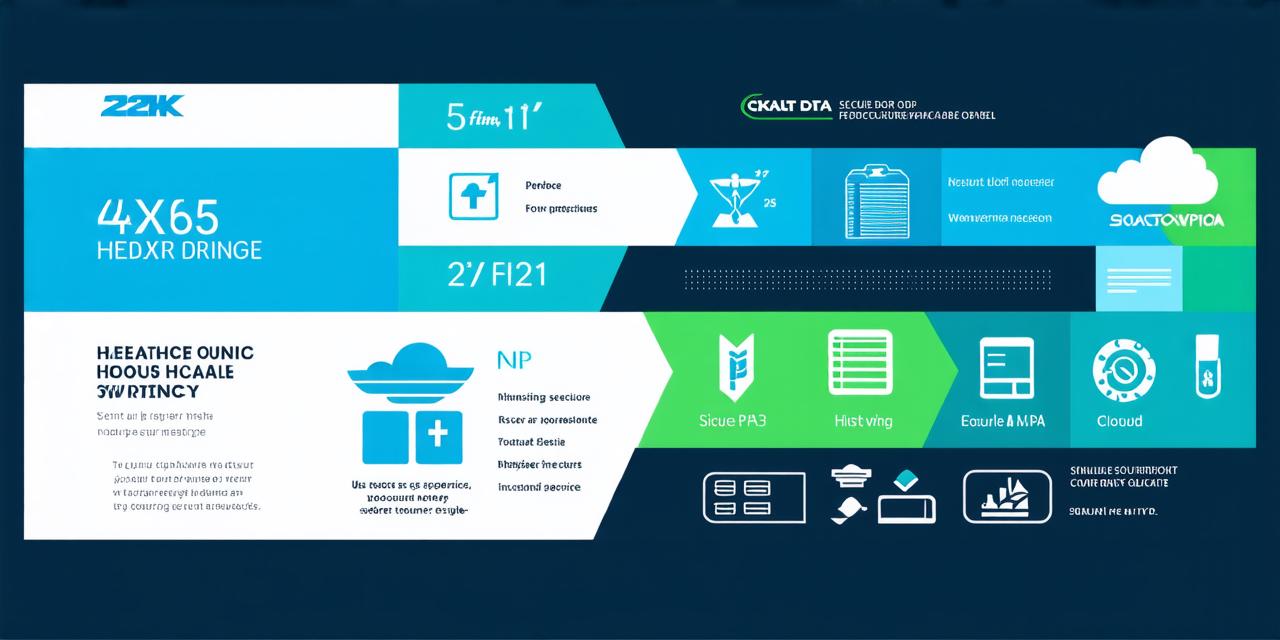Introduction
The healthcare industry is rapidly evolving, and the digital transformation of this sector is a critical component of its growth. One aspect of this digital transformation that has gained significant attention in recent years is healthcare hosting.
Healthcare hosting refers to the provision of secure and reliable IT infrastructure for healthcare providers. It involves the use of cloud-based solutions to store, manage, and process sensitive patient data, enabling healthcare organizations to improve patient care, streamline operations, and reduce costs.
Why Healthcare Hosting Matters
Healthcare hosting is essential for several reasons. Firstly, it provides a secure environment for storing sensitive patient data, such as medical records, billing information, and personal details.
Secondly, healthcare hosting enables healthcare providers to improve their efficiency by allowing them to access patient data from anywhere, at any time. With cloud-based solutions, healthcare providers can easily collaborate with colleagues, share information, and make informed decisions quickly. This increased speed of communication and information sharing can lead to faster diagnosis and treatment, resulting in better patient outcomes.
Thirdly, healthcare hosting reduces the costs associated with maintaining IT infrastructure. Healthcare hosting solutions provide organizations with access to state-of-the-art equipment and software without having to invest in physical hardware or pay for expensive maintenance and upgrades. This cost savings can be redirected towards other areas of the business, such as patient care, research, or staff training.
Components of Healthcare Hosting
Healthcare hosting solutions typically comprise several components, including:
-
Data Storage: Cloud-based storage allows healthcare providers to store vast amounts of data securely and access it from anywhere in the world. This is especially useful for medical records, which require strict access controls and backup and recovery capabilities.
-
Application Hosting: Healthcare hosting solutions can also host applications that are used by healthcare providers. These applications may include electronic health records (EHRs), billing systems, or patient portals.
-
Backup and Recovery: Healthcare hosting solutions typically provide backup and recovery services to ensure that critical data is always available in the event of a disaster or system failure. This is especially important for healthcare providers, given the sensitivity of the data they handle.
-
Security: Healthcare hosting solutions use advanced security measures to protect patient data from unauthorized access or cyber-attacks. These measures may include firewalls, intrusion detection systems, and encryption.
-
Compliance: Healthcare hosting solutions must comply with various regulations, such as the Health Insurance Portability and Accountability Act (HIPAA) in the US. This requires that healthcare hosting providers have robust data security protocols in place to protect patient information.
Real-Life Examples of Healthcare Hosting
Many healthcare organizations have successfully implemented healthcare hosting solutions, resulting in improved efficiency, enhanced security, and cost savings. Here are a few real-life examples:
-
Children’s Hospital Los Angeles (CHLA) uses Amazon Web Services (AWS) as its healthcare hosting solution. CHLA has been able to store over 20 petabytes of data on AWS, including patient records, medical images, and research data. This has allowed CHLA to improve the speed of data access, reduce costs, and enhance security.
-
Mayo Clinic uses Microsoft Azure as its healthcare hosting solution. Mayo Clinic has been able to store over 100 petabytes of data on Azure, including patient records and medical images. This has allowed Mayo Clinic to improve collaboration between doctors and researchers, reduce costs, and enhance security.
-
Kaiser Permanente uses Google Cloud as its healthcare hosting solution. Kaiser Permanente has been able to store over 10 petabytes of data on Google Cloud, including patient records and medical images. This has allowed Kaiser Permanente to improve the speed of data access, reduce costs, and enhance security.
Risks Associated with Poor Healthcare Hosting
While healthcare hosting solutions can provide significant benefits, they also come with risks if not implemented properly. Here are a few risks associated with poor healthcare hosting:
-
Data Breaches: If healthcare hosting providers do not implement robust data security measures, patient data may be vulnerable to cyber-attacks and data breaches. This can result in the loss of sensitive information, such as medical records or personal details, which can have serious consequences for patients.
-
System Downtime: Healthcare organizations rely on IT systems to provide critical services to patients. If healthcare hosting providers experience system downtime or failures, this can result in delays in diagnosis and treatment, increased costs, and reduced patient satisfaction.
-
Compliance Violations: Healthcare hosting solutions must comply with various regulations, such as HIPAA in the US. If healthcare hosting providers do not comply with these regulations, they may face significant fines and legal action
Best Practices for Selecting a Healthcare Hosting Solution
When selecting a healthcare hosting solution, it’s essential to consider several factors, including:
-
Security: The security of patient data is paramount. Look for a healthcare hosting provider that uses advanced encryption, access controls, and other security measures to protect patient information.
-
Compliance: Healthcare hosting solutions must comply with various regulations, such as HIPAA in the US. Look for a healthcare hosting provider that is compliant with these regulations and has robust data security protocols in place.
-
Scalability: Healthcare organizations need to be able to scale their IT systems as their needs change. Look for a healthcare hosting provider that offers scalable solutions that can grow with your organization.
-
Cost: Healthcare hosting solutions can vary in cost, depending on the features and services provided. Look for a healthcare hosting provider that offers cost-effective solutions that provide value for money.
-
Support: Healthcare organizations require 24/7 support to ensure that their IT systems are always available. Look for a healthcare hosting provider that offers responsive and reliable support services.
Summary
Healthcare hosting is an essential component of the digital transformation of the healthcare industry. It provides secure and reliable IT infrastructure for healthcare providers, enabling them to improve patient care, streamline operations, and reduce costs. Healthcare hosting solutions typically comprise several components, including data storage, application hosting, backup and recovery, security, and compliance. Many healthcare organizations have successfully implemented healthcare hosting solutions, resulting in improved efficiency, enhanced security, and cost savings. However, poor healthcare hosting can result in serious risks, such as data breaches, system downtime, and compliance violations. When selecting a healthcare hosting solution



